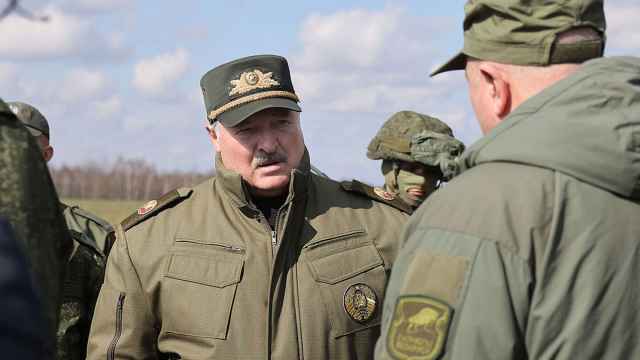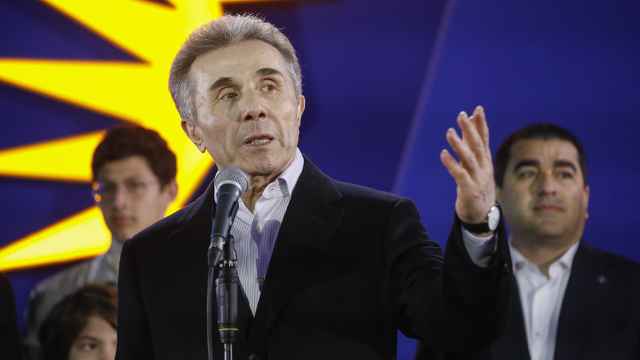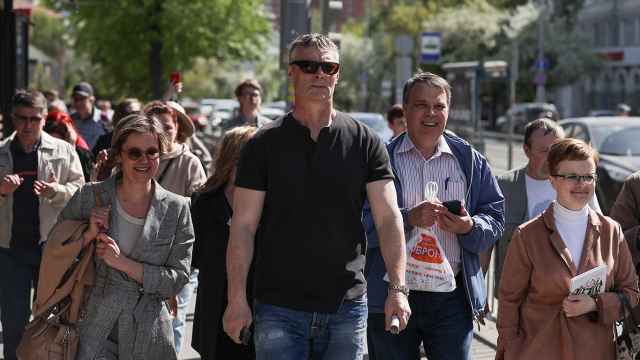A NATO plan to turn an airport in Ulyanovsk into a hub for transporting cargo from Afghanistan has put the Kremlin in the unusual position of trying to explain how doing business with the Western alliance that has long been Russia's foe can be profitable for the country.
The tricky situation heated up last weekend when a group of Communist activists set up tents close to Ulyanovsk's Vostochny Airport and declared a hunger strike in protest against the proposed move they view as selling out the country's strategic heartland to the West.
The city on the Volga is named after Vladimir Lenin, who was born as Vladimir Ulyanov 142 years ago in the city that was then known as Simbirsk.
On Tuesday, the Communists vowed they would never let Western military interests encroach so deep into Russia.
"Next to Ulyanovsk are Samara and Nizhny Novgorod, the country's military-industrial centers," Communist Deputy Anatoly Lokot told the State Duma, Interfax reported.
Lokot also attacked Defense Minister Anatoly Serdyukov — who has said letting NATO use the airport would be economically profitable — by saying his argument amounted to trading away national security.
"We won't let anybody trade with [our] territory," Lokot was quoted as saying.
Notably, the Communists have been joined by opposition activists from both sides of the political spectrum — nationalist poet Eduard Limonov and Left Front leader Sergei Udaltsov.
Last week, Limonov's Other Russia movement staged a spectacular , during which activists set off orange signal flares and held up a huge banner reading "Foreign Ministry — traitors' den" outside the ministry's landmark skyscraper.
Foreign Minister Sergei Lavrov has stressed that the included no plans for a military base and that Ulyanovsk would only serve as a transit hub under full Russian control and with no NATO personnel, either civil or military.
Lavrov's deputy Alexander Grushko even argued that rather than a hub, the talks with NATO centered on "temporary depots" for strictly commercial shipments of "nonlethal goods," RIA-Novosti reported.
Left Front leader Udaltsov, currently on hunger strike in solidarity with Astrakhan opposition leader Oleg Shein, he sympathized with the criticism and had little trust in such public assurances.
"Our officials have fooled us too often before," he told The Moscow Times on Tuesday. Udaltsov added that a plan as vital as that should be put to a referendum.
"Anything regarding foreign troops on our territory should be decided by the people," he said.
The opposition criticism was ridiculed by Deputy Prime Minister Dmitry Rogozin, who oversees the defense industry and declared last month that "the transit of NATO toilet paper" cannot amount to treason.
on Facebook late Monday, he called the Ulyanovsk protests the "most absurd possible," arguing that they resembled "Alaskan Aleuts taking a vow of silence in protest against a rams' testicles surplus in the Antarctic."
The government has said a deal with NATO would bring much-needed cash to the region, an argument that has been embraced by the local political leadership.
They point out that freight carrier Volga-Dnepr, which already flies military goods for NATO, stands to gain most. The region's Deputy Prime Minister Vildan Zinnurov said each takeoff or landing of an Antonov-124 freighter earns the airport more than 150,000 rubles ($5,000) in fees.
"This allows the airport to invest in its growth, and the region gets extra tax revenue," he Kommersant.
In an open letter to citizens on his website last week, Ulyanovsk Governor Sergei Morozov lambasted the anti-NATO protesters as provocateurs and populists, who were working for their own political ends.
Analysts said the government has only itself to blame after depicting the Western alliance as the country's main enemy over many years.
"They are harvesting the hysteria they sowed themselves," said Alexander Konovalov of the Institute for Strategic Assessments.
A senior NATO official said Tuesday that it was too early to say when an agreement on using Ulyanovsk would be finalized.
Speaking on condition of anonymity because he was not authorized to comment publicly, the official pointed out that the deal should enable transports by rail and air over Russian territory out of Afghanistan. Transports to Afghanistan are already covered in a 2009 agreement with Moscow.
What could complicate talks with Moscow is that NATO wants to "slightly" enlarge the definition of nonlethal cargo, so that it can include armored vehicles, the official said.
But experts said the alliance must look for ways to increase transit through the northern route, as Pakistan has become too dangerous.
They estimate that more than 100,000 soldiers must leave Afghanistan within two years, together with at least 70,000 vehicles and 120,000 containers.
"This will require a lot of flights with big planes," said Otfried Nassauer, of the Berlin Information Center for Transatlantic Security, a think tank.
Nassauer speculated that the idea of a hub deep inside Russia was the Kremlin's idea rather than NATO's. He recalled that Moscow four years ago threatened to withdraw overflight rights from Lufthansa if the German carrier did not use Krasnoyarsk as its regional hub. "They just want to earn money," he said.
He added that NATO will study the experience of alliance members who have already withdrawn from Afghanistan. He said both Canada and the Netherlands sold a lot of equipment locally to reduce the cargo.
Canadian media reported earlier this year that military containers shipped through Pakistan arrived in Canada with sand and rocks instead of the equipment, which must have been pilfered on the way.
A Message from The Moscow Times:
Dear readers,
We are facing unprecedented challenges. Russia's Prosecutor General's Office has designated The Moscow Times as an "undesirable" organization, criminalizing our work and putting our staff at risk of prosecution. This follows our earlier unjust labeling as a "foreign agent."
These actions are direct attempts to silence independent journalism in Russia. The authorities claim our work "discredits the decisions of the Russian leadership." We see things differently: we strive to provide accurate, unbiased reporting on Russia.
We, the journalists of The Moscow Times, refuse to be silenced. But to continue our work, we need your help.
Your support, no matter how small, makes a world of difference. If you can, please support us monthly starting from just $2. It's quick to set up, and every contribution makes a significant impact.
By supporting The Moscow Times, you're defending open, independent journalism in the face of repression. Thank you for standing with us.
Remind me later.






